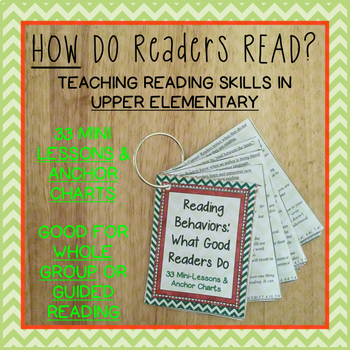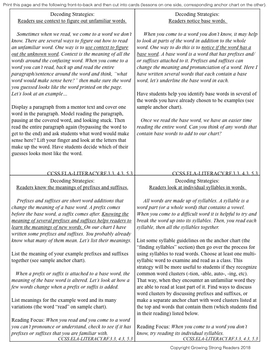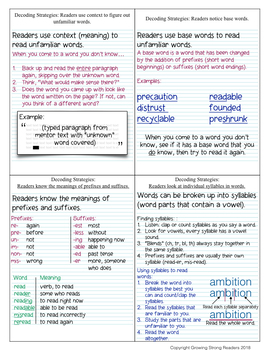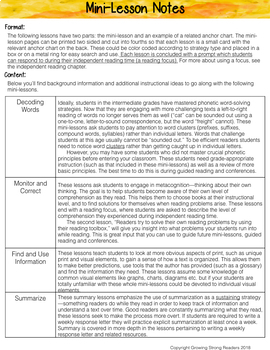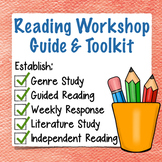33 Reading Strategy & Skills Mini-Lessons for Reading Workshop w/ Anchor Charts
- Zip
What educators are saying
Also included in
- A guide to help you implement an organized, informed, and effective reading workshop. Includes information and tools for instituting routines (first 20 days), independent reading, guided reading, literature study, genre study, conferences and book talks. A guide to standardized test preparation is aPrice $35.00Original Price $47.00Save $12.00
Description
Use these 33 mini lessons to guide your whole group and small group instruction. Each lesson focuses on a reading behavior and ends with a "reading focus." Students apply the mini-lesson skill during independent reading by responding to the focus.
A great resource for teachers, administrators and reading coaches who are interested in delivering focused instruction in a reading workshop or guided reading context. Includes:
33 Mini-Lessons:
The lessons focus on reading behaviors--they demonstrate what good readers DO. Each lesson card features a lesson script on one side, and a sample anchor chart on the other. Print cards front-to-back, then place on a metal ring for easy access during mini-lessons or guided reading!
List of Mini Lessons
Decode Words:
Readers use context to read unfamiliar words.
Readers notice base words.
Readers notice word parts (prefixes, suffixes).
Readers take apart words by syllables.
Readers notice compound words.
Monitor & Correct:
Readers notice when they do not understand what they are reading.
Readers try to solve their own reading problems by using their reading “toolbox.”
Find and Use Information:
Readers “read” visual elements like diagrams, charts, photos etc.
Readers notice unique print such as bold print or italics.
Readers search for information in a book (glossary, index, table of contents, etc.).
Summarize:
When returning to a chapter book, readers remember what they have already read.
Readers notice and remember the most important parts of a text.
Readers can describe the most important parts of a completed book.
Maintain Fluency:
Readers choose books that they can read at a good rate.
Readers pause when something doesn’t sound/look right.
Adjust:
Readers read a novel beginning to end, but may read only parts of non-fiction, and may read it slightly out of order.
Make Connections:
Readers relate to characters, stories and ideas.
Readers make connections between several texts.
Readers relate the events/info. in a book to the real world.
Predict:
Readers make logical predictions.
Readers notice when the plot is suspenseful.
Readers adjust predictions as they read.
Infer:
Readers know how to “read between the lines.”
Readers understand characters by noticing their actions, feelings and thoughts.
Readers pay close attention to “hints” left by the author.
Synthesize:
Readers learn & remember important information from their reading.
Analyze:
Readers notice how an author has organized a text.
Readers can describe the author’s writing style.
Readers know when an author is using literal or figurative language.
Readers notice similar themes and styles among books written by the same author.
Critique:
Readers can evaluate the accuracy of a text.
Readers can identify the author’s opinion and agree or disagree with it.
Readers can explain why they liked or disliked a book.
Teacher Guide
A guide to planning effective mini-lessons that can be reinforced by reading workshop routines.
Includes:
—Overview: Planning Effective Mini-Lessons
—Choosing Content for Mini-Lessons
—Anchor Chart Tips
—2 Mini-Lesson Planning Sheets
—Example Planning Sheet
THESE LESSONS ARE ALSO AVAILABLE IN MY READING WORKSHOP BUNDLE
Save money and buy the bundle! Includes this product plus 9 others—everything you need to implement independent reading, conferences, mini-lessons, guided reading, book talks, literature study and balanced test prep.
Reading Workshop Guide & Toolkit BUNDLE
Other Reading Workshop Resources:
Establishing Structured Independent Reading
Reading Notebooks & Reading Response
Book Talks: Building a Reading Culture
Guide to Read Alouds & Genre Study
Crafting Effective Guided Reading Lessons
Planning & Implementing Literature Study
Test Preparation & Reading Workshop
FREE Guide to Reading Conferences
Ready for More Mini Lessons?
I am currently creating a series of genre units. Each unit includes read alouds, mini-lessons and guided practice. The mini lessons include genre-specific content as well as processing strategies (how to read). Together the units will form an in-depth, cohesive reading curriculum—perfect for the reading workshop classroom! Here's a list of completed units. FOLLOW MY STORE to be updated when new units are available.
Realistic Fiction Genre Unit (grades 3-4)
Realistic Fiction Genre Unit (grades 5-6)
Historical Fiction Genre Unit (grades 3-4)
Historical Fiction Genre Unit (grades 5-6)
Fantasy Genre Unit: Traditional Literature & Modern Fantasy (grades 3-4)
Fantasy Genre Unit: Traditional Literature & Modern Fantasy (grades 5-6)
Biography, Autobiography, & Memoir (grades 3-4)
SIGN UP for my newsletter to be notified when new genre units are available.
★★★★★★★★★★★★★★★★★★★★★★★★★★★★★★★★★★★★★★
Let’s keep in touch!
→Sign Up For My Monthly Newsletter--You'll be entered into a drawing for a $10 TPT GIFT CARD

